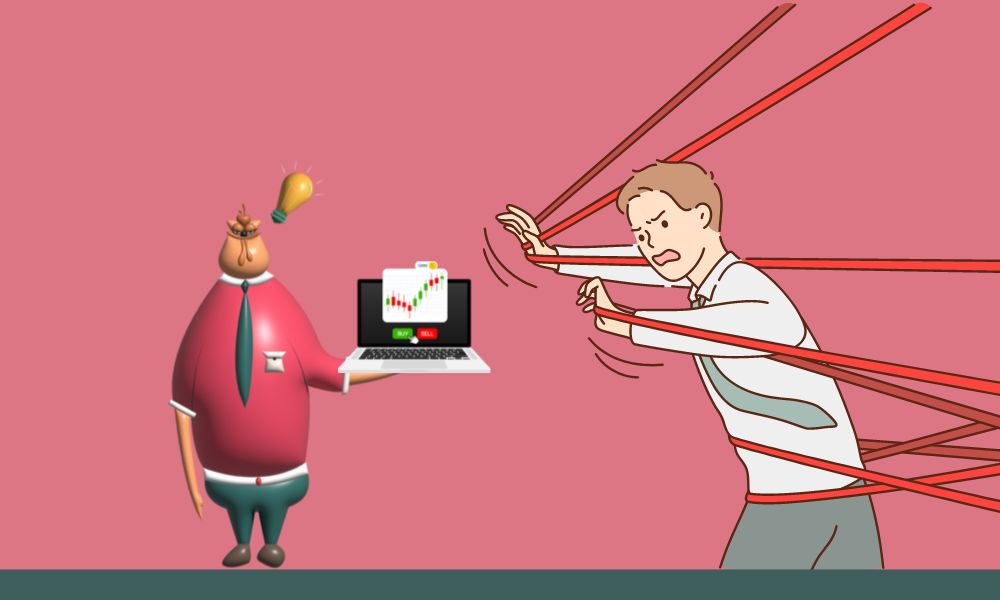
A retail trader is someone who does business for himself rather than for a company or other organization. A retail trader is someone who deals with their own money but not for a living.
They do their own stock and bond trading (PA). A professional trader is one who works for an organization and is paid to trade other people's money.
Institutional traders are in charge of purchasing and selling securities on behalf of a company or organization. Many institutional traders are pension funds, mutual fund families, insurance firms, and exchange-traded funds (ETFs).
Institutional traders can purchase assets such as futures and swaps that ordinary traders cannot. Most people avoid trading since there are so many different types of transactions that are difficult to grasp.
The SEC defines retail traders as investors who aren't very knowledgeable and require assistance since they can't make hazardous intricate transactions.
Most stock traders lose money due to a lack of information. Many people desire to educate themselves, but they look in the wrong places and wind up with a subpar education.
Many stock buyers refer to themselves as traders. When asked how they research stocks, they respond that they read newspapers, websites, and online charts with their broker.
When pressed further, they concede that, while they recognized the fundamental data required to analyze a stock, they had no idea how to interpret a chart. None of them had a plan or any knowledge of money management.
An educated trader understands how to create a sound trading strategy, study a stock to understand why they're buying and selling, and manage the trade.
They also utilize stop-loss orders and position sizing to reduce investment risk while increasing returns. If you want to build long-term wealth through stock investing, read my 10 best share tips to dispel many myths.
Stock trading is dangerous. Most market participants are willing to take higher risks because they believe they can trade after reading a few books or taking a weekend course.
Many traders seek quick gratification by plunging headfirst into the stock market using complex tactics. Many people waste their money on erroneous hopes.
In trading, I believe that knowledge must be applied correctly. In a bull market, many traders choose to triumph by luck rather than expertise.
Strong bull markets can mask weaknesses in judgment and a lack of understanding. Therefore, I don't think you can call yourself a trader till you've been trading successfully for at least two years.
People approach me every week to teach them how to trade quickly, efficiently, and cheaply. You are most likely in the 90% Realize if it describes you.
Would you see a doctor who only watched videos or went to a weekend workshop? Would you trust someone who has read a driving book to drive your car or let your children travel on a bus with such a driver?
A university degree takes three to four years or more to complete in order to enter your chosen field. Similarly, stock market trading is a business that must be treated as if it were a career.
Most stock traders lose money because they do not appreciate it. Long-term success is unlikely unless a trader combines knowledge and experience.
Learning to trade is simple; understanding your psyche is difficult. Your trading performance will be determined by the nine inches between your ears. Psychology is the second most common reason traders fail, after a lack of knowledge.
The attitude or psychology of a trader influences both their trading and the stock market. Fear and greed drive traders and investors alike without sufficient education, resulting in costly mistakes.
Many people with no knowledge or experience attempt to trade Forex. When I ask why, they usually say they don't have much money, which is exactly why they shouldn't be trading.
People with little money to invest but a desire to trade leveraged markets are typically greedy. They claim that with $2,000 to invest, a leveraged product will outperform the stock market.
They will profit $4,000 if the stock rises 20% by a factor of ten. They believe that rapid rewards are worth the risk, but they rarely consider what they might lose.
This romantic notion is incorrect. The market is unconcerned about how much you know or how much money you have; it does what it does regardless of whether or not you make money trading stocks.
If you don't have much money, you're emotionally tied to it and can't bear the thought of losing it. If a trade goes wrong, even if it is minor, fear of loss sets in, resulting in poor decisions and losses.
Individuals monitor their trades on a daily or intraday basis and make judgments based on short-term market volatility. People overtrade as they hunt the market for lost wealth or profit.
Beginners compound their mistakes by exiting profitable transactions too soon for fear of losing reward.
Fear is a far stronger emotion than greed, and it stems from a lack of understanding or trust in the individual's trading strategy, as well as their inability to execute it successfully. Not fear, but greed or the desire for immediate rewards drives us to make a trade.